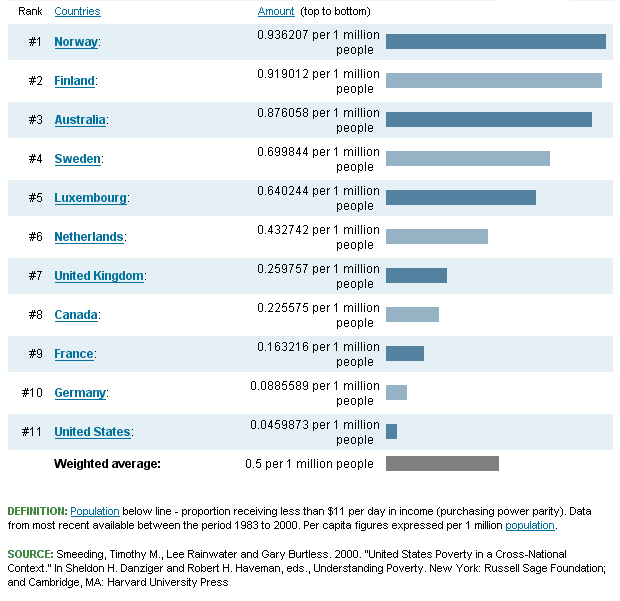Note: Lots of updates at the bottom
We have all heard that the US is backward vs. our much more enlightened bretheren in Europe on income inequality. The general argument is that US is somehow a worse place because out income inequality is higher than in most European countries.
My reaction has always been, so what? Why should I care about how well I am doing vs. the richest folks. Shouldn't I care more how I am doing on an absolute scale? And in fact, on an absolute scale, our poor are doing better than everyone else's poor, and better than many nation's middle classes. I thought this analysis of poverty was interesting: It is the number of people (per million) in a county living on less than $11 per day (lower number and rank is better)
Per Capita Population Under $11 per Day

So, nations of Europe, how is that welfare state working out for you? Socialist paradise Norway is 20 times worse! How long will your poor be happy being told that, well, yes, the poor in the US are better off than you are, but you should feel better, because our rich in Europe are doing much worse than the rich in the US.
PS- Stats from NationMaster.com, a database of country by country statistics of all sorts. Cool site, which also has a state by state counterpart.
Update: Now that I have had time to poke around, I cannot find this data in the sources quoted, so it must be considered potentially suspect. The sources quoted actually try to make the point that US lags Europe in fighting poverty, so the conclusion of the chart above is not even consistent with the sources. (my guess is the data comes from the Luxemburg Income Study). However, it is interesting that this source material makes the same mistake I am trying to correct for here: That is, it defines poverty as a percentage of the median income in the particular country, rather than an absolute value, such that a country can have poor who are better off but still fail on the metric. You can see that here, where US has high poverty as on a "percent of median income" definition, but since we have the highest incomes in the world, it effectively gives the US the highest poverty bar to clear.
Here is what I am looking for: Ideally, I would like to find a comparison of the median income say of the bottom quintile of each country, compared in absolute dollars on a PPP basis across countries. I would like to see the number both before and after government transfer payments. Europe, in their welfare economies, do better on poverty metrics when government transfer payments are included (and I am almost sure the chart above is before government transfer payments). However, I would argue that for the long term health of the economy, you would like to see how the poor are doing before these payments. Ultimately, and I will borrow a bit of environmentalist language here, this is going to be the most sustainable economy, where the poor gain wealth on their own, not from the welfare system. In fact, the welfare state, and this was my original point, actually suppresses self-earned income of much of the poor by eliminating the incentive to work. That is why I still think the chart at the top may be correct.
Update #2: One other difference between the US and European nations is that we are much more open on immigration (yes, it may be illegal, but we pretty much still allow it). These immigrants, legal or not, are counted in our economic and poverty stats. If we assume there are about 15 million mostly poor illegal immigrants, plus millions of other quasi-legal immigrants, plus millions more who got amnesty in the 1980's, these immigrants add at least a fast five percentage points to any poverty metric the US is measured on.
I have been surfing tonight, and it seems there are a ton of studies showing that US poverty is growing for some reason. Duh. Tens of millions of absolutely poor people, mainly from south of the border, have come to the US over the last several decades. It is no secret all these immigrants are poor -- that is why they are coming here, to find something better for themselves. Of course we have had a surge in poverty - we have been importing it like crazy! I happen to be pro-immigration, but I am fed up with these studies that try to pin the blame on growing poverty in the US on government transfer payment policy. It's the immigration, stupid! Several studies particularly lament the fact that childhood poverty is rising in the US. Can anyone think of a way this might be correlated to tens of millions of strongly Catholic Mexican immigrants, each and every one committed to large families?
 Oregon State Climatologist George Taylor sends in a picture of one of the official temperature measuring sites that feed into the databases that are used to track global temperature.
Oregon State Climatologist George Taylor sends in a picture of one of the official temperature measuring sites that feed into the databases that are used to track global temperature. 



